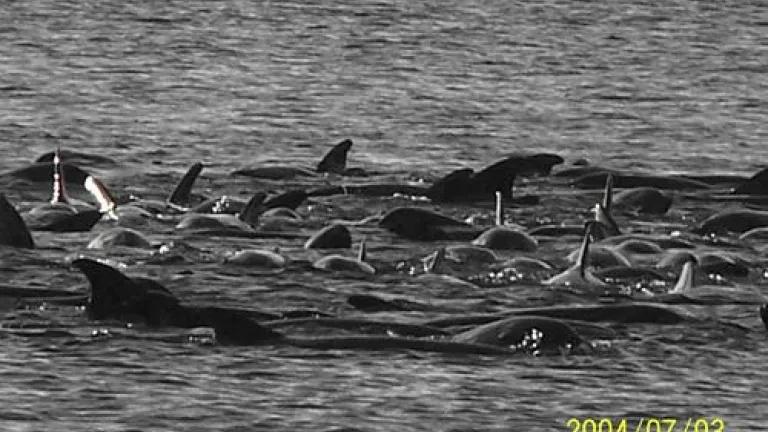This Week in Whales: Feds Violated Endangered Species Act When Greenlighting Navy Training in Pacific Northwest; Surprise! (Not) Exxon Responsible for Stranding of 100 Melon-Headed Whales...

News in the world of whales this week (or close to it):
- As I noted yesterday, a federal court has ruled that the National Marine Fisheries Service (NMFS) violated the Endangered Species Act when it failed to utilize the best scientific data available when assessing harms to protected species from the Navy’s use of sonar. The Navy’s exercises are expected to harm thousands of whales, dolphins, porpoises, seals and sea lions along the coasts of coasts of Northern California, Oregon, and Washington. In an opinion released late Wednesday, Magistrate Judge Nandor Vadas, U.S. District Court for the District of Northern California, found that NMFS’s approval of the Navy’s training activities in its Northwest Training Range Complex failed to use the best available science to assess the extent and duration of impacts to whales and other marine mammals. The decision requires the federal agency to reassess its permits to ensure that the Navy’s training activities comply with protective measures in the Endangered Species Act.
- Some more good news for whales: the Department of the Interior has postponed its decision on whether to allow seismic airgun surveys off the Atlantic Coast. Of course, a delay is not a win, which is why conservation organizations will be working to scuttle any such exploration between now and the new March 2014 deadline. The oil and gas industry has been pushing to explore the region for years (its applications for exploration are still on the table) and they aren’t going to give up easily.
- A study released earlier this week found that Exxon’s use of multi-beam echosounders to map the ocean floor was responsible for the mass stranding of about 100 melon-headed whales that took place in the Loza Lagoon in Madagascar in 2008. We know that sonar training and testing and seismic surveys using airguns harm marine mammals, but, as my colleague blogged, echosounders operate at a higher frequency and were therefore thought to be less harmful. Surprise! Further evidence that our assumptions about the impacts noise pollution has on marine species have been seriously misguided and harmful to marine life.
- Government officials, shipping companies, and marine scientists have collaborated on a new app called "Whale Spotter," which uses crowd-sourcing to gather data from sailors, fishers, marine scientists, and others that could help save whales from ship strikes. App-users who spot whales will upload the location and time of the sighting so that shipping companies can slow down or alter their course so as to avoid striking the whales. The app is being tested this week in the San Francisco Bay, where ship strikes pose a serious threat to migrating whales.
- Paleontologists in Peru have discovered a whale fossil believed to be over 40 million years old—and it has legs. The "first whale" lived on land around 50 million years ago, but ate fish. Eventually, it became fully aquatic and lost its fur and ability to walk. This new discovery helps scientists chart the transition from awesome wolf-like predator to even more awesome whales of yore.
Meanwhile, this week in Wales…
The Coed-y-Brenin forest bike center has opened in the heart of Snowdonia. I think we can all breathe a sigh of relief that a “Gwynedd forest has cemented its place as a world-class mountain biking destination.” But seriously, this place looks awesome. I’d be happy to fly out and review it in person if Forestry Commission Wales would like the TWIW stamp of approval.
Photo Credit: Melon-headed whales in Hanalei Bay, July 3, 2004, who were luckier than those stranded in Madagascar in 2008. Photo by Gretchen Johnson for NOAA

